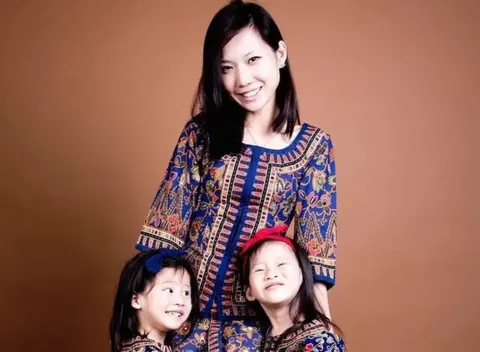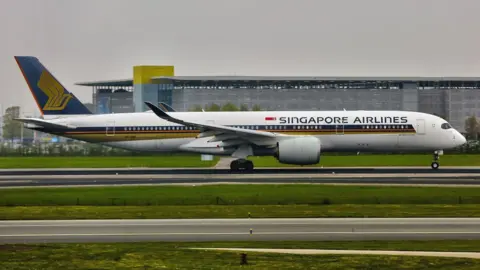The airline policy that cost pregnant flight crew their jobs
 BBC
BBC"Flying was my first career, so I did not have any basis of comparison to other industries. I didn't think much about whether I was being short-changed because it applied to everyone."
When Clara Fu realised that she was pregnant, her joy quickly turned to worry.
The former flight attendant for Singapore Airlines (SIA) knew she would have to quit her job, as the airline required pregnant cabin crew to resign at the end of their first trimester.
She eventually returned to the role. However, she soon learned that she was expecting again.
As the sole breadwinner in her family, Ms Fu told the BBC that she couldn't afford to leave her job.
So she hid her pregnancy and continued flying for five months. She only resigned when a passenger noticed her baby bump.
"It was difficult. I managed to carry on as usual for as long as I could," Ms Fu says.
SIA's half-a-century-old policy, which it dropped in July, was legal in Singapore because the country does not have anti-discrimination laws, Clarence Ding from the Simmons & Simmons law firm told the BBC.
"This is not to say SIA's policy was not problematic. [Singapore's employment guidelines] state that employers should implement fair employment practices," he says.
"The guidelines do not have the force of law. It does not prescribe any penalties for non-compliance. The only reason why companies adhere to the guidelines is because the Ministry of Manpower (MOM) has repeatedly stated that all employers must do so," Mr Ding adds.
"The MOM holds the real power as it has the ability to sanction employers by scrutinising their employment practices more closely and by curtailing their work pass privileges."
Although SIA did not give a reason for the change, it comes as airlines around the world have been struggling with staff shortages after mass lay-offs during the pandemic.
Under the new rules, pregnant flight crew can apply to be moved to another role for up to nine months, and return to flying after giving birth.
"Eligible cabin crew who have applied for ground positions so far have been offered available positions suitable for their expertise. These jobs include administrative support in our cabin crew division," SIA said.
Long-held rule
Women's roles in SIA's cabin crew have been key to its appeal since it was founded half a century ago.
Promoted as the "Singapore Girl", the airline's flight attendants wear a version of the sarong kebaya, traditional clothing worn by Peranakan women in parts of South East Asia. The uniform was designed by French couturier Pierre Balmain.
New recruits attend a 14-week training programme to learn how to present themselves, prepare meals and respond to emergencies.
Many women felt privileged to be in the role, says Elizabeth Low, who worked for SIA in the 1980s.
"Being pregnant was not an option. No one kicked up a fuss because everyone knew. You either sacrificed your family life or your career," she adds.
"The airline's repute, and the resulting prestige of the job has allowed it to be highly selective during its recruitment process," the Singapore Academy of Corporate Management said in a report.
"About 10% of applicants of each recruitment drive are successful and sent for training on their first steps to becoming a Singapore Girl," the report added.
Ashley Hong left SIA after less than two years in 2011 because she was pregnant.
Although she believes pregnant crew should be stopped from flying for their safety, she wishes she had been given the option to stay with the company.
 Ashley Hong
Ashley Hong"I suppose when we all signed up for this job, it was with the deep knowing that the job had its limitations and an expiry date should we become pregnant," Ms Hong says.
"Knowing it was an eventual outcome left no room for feelings of unhappiness of any sort."
'Discriminatory and sexist'
Singapore's Association of Women for Action and Research (Aware) has spoken up against the practice for over a decade. The group said it had received complaints from flight crew who were forced to quit.
"It was absolutely unacceptable for SIA to require employees to resign when they were pregnant. It was discriminatory and sexist," Aware's executive director Corinna Lim told the BBC.
"Even if it is somehow legal, the practice clearly goes against the spirit of the maternity protection laws that exist in Singapore to enable mothers to pursue careers and earn a living," she adds.
Back in 2010, SIA said it required pregnant flight crew to resign because "the physical demands of the job mean that all our cabin crew must be fit to perform their duties".
"As a responsible employer, we would not think of compromising the physical well-being of pregnant crew and their unborn children," the airline said in a response published in Singapore's Straits Times newspaper.
"Our cabin crew are on five-year contracts, rather than on permanent terms, and it is for the reasons stated above that the employment of female crew ceases after the first trimester of a pregnancy," it added.
The International Air Transport Association (Iata), the industry's trade body, told the BBC it has no recommendations on the policy because "these are HR (human resources) policies by individual companies".
Other major airlines have not required pregnant cabin crew to resign.
Pregnant crew working at British Airways, Qatar Airways and Qantas are offered jobs on the ground.
Meanwhile, crew working for Cathay Pacific, Hong Kong's national carrier, "may choose to take up paid ground duties or go on unpaid leave until the start of their statutory maternity leave".
"After the completion of their leave, cabin crew can return to flying duties when they have successfully passed the relevant safety training courses. These policies have been in place for over a decade," the airline says.
Ms Lim is still concerned that SIA's requirements when it comes to flight attendants' appearance, which include a prescribed Body Mass Index (BMI) range "may further restrict the opportunities for anyone - returning mother or no - who does not fit into the company's requirements".
SIA said in response that it maintains "the same grooming standards for all our cabin crew".
Changing times
In 2021 Singapore's Prime Minister Lee Hsien Loong said the city state planned to enshrine its guidelines on workplace discrimination into law.
"Philosophically, writing [the] guidelines into the law is a major move. It signals that we do not tolerate discrimination at workplaces," Mr Lee said.
He added that a tribunal will be created to tackle discrimination over gender, nationality, age, race, religion and disability.
"The workplace has changed radically in recent years. It has forced a ground-up rethink within organisations around what kinds of policies are acceptable," says Mr Ding.
"This is very much a by-product of the war for talent, with companies scrambling to attract the brightest and the best to work for them," he adds.
 Getty Images
Getty ImagesMs Fu, who currently works in the pharmaceutical industry, welcomed the change.
She says she missed out on a S$15,000 ($10,964; £9,137) bonus, which SIA awarded for every five years of service, because of her pregnancy.
"I'm lucky because my parents and parents-in-law were supportive. It would have been worse if I didn't have that," Ms Fu says.
"As a national carrier, SIA should really be supporting women with young families. If there was better support, I might have stayed on."

